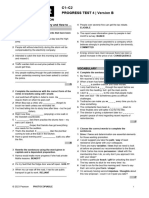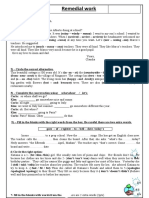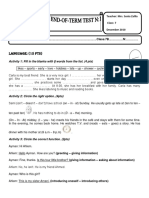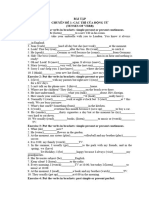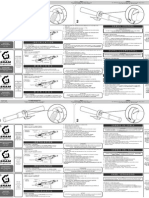100%(1)100% found this document useful (1 vote)
447 viewsPast Simple / Present Perfect: Fill in The Gaps With The Correct Verb Form
Past Simple / Present Perfect: Fill in The Gaps With The Correct Verb Form
Uploaded by
desy pastina lontohThe document provides examples of using the past simple and present perfect tenses to fill in gaps in sentences. It includes 20 sentences with verbs missing that need to be filled in with the correct tense. It then provides additional exercises with verbs in brackets that need to be changed to the appropriate tense. The exercises focus on practicing using the past simple and present perfect tenses.
Copyright:
© All Rights Reserved
Available Formats
Download as DOCX, PDF, TXT or read online from Scribd
Past Simple / Present Perfect: Fill in The Gaps With The Correct Verb Form
Past Simple / Present Perfect: Fill in The Gaps With The Correct Verb Form
Uploaded by
desy pastina lontoh100%(1)100% found this document useful (1 vote)
447 views3 pagesThe document provides examples of using the past simple and present perfect tenses to fill in gaps in sentences. It includes 20 sentences with verbs missing that need to be filled in with the correct tense. It then provides additional exercises with verbs in brackets that need to be changed to the appropriate tense. The exercises focus on practicing using the past simple and present perfect tenses.
Original Description:
kkyulhuojpjipkp
Original Title
10110015322075
Copyright
© © All Rights Reserved
Available Formats
DOCX, PDF, TXT or read online from Scribd
Share this document
Did you find this document useful?
Is this content inappropriate?
The document provides examples of using the past simple and present perfect tenses to fill in gaps in sentences. It includes 20 sentences with verbs missing that need to be filled in with the correct tense. It then provides additional exercises with verbs in brackets that need to be changed to the appropriate tense. The exercises focus on practicing using the past simple and present perfect tenses.
Copyright:
© All Rights Reserved
Available Formats
Download as DOCX, PDF, TXT or read online from Scribd
Download as docx, pdf, or txt
100%(1)100% found this document useful (1 vote)
447 views3 pagesPast Simple / Present Perfect: Fill in The Gaps With The Correct Verb Form
Past Simple / Present Perfect: Fill in The Gaps With The Correct Verb Form
Uploaded by
desy pastina lontohThe document provides examples of using the past simple and present perfect tenses to fill in gaps in sentences. It includes 20 sentences with verbs missing that need to be filled in with the correct tense. It then provides additional exercises with verbs in brackets that need to be changed to the appropriate tense. The exercises focus on practicing using the past simple and present perfect tenses.
Copyright:
© All Rights Reserved
Available Formats
Download as DOCX, PDF, TXT or read online from Scribd
Download as docx, pdf, or txt
You are on page 1of 3
PAST SIMPLE / PRESENT PERFECT
Fill in the gaps with the correct verb form.
1. The Titanic (sink) in 1912.
2. Somebody (steal) my bicycle! Now I’ll have to walk home.
3. Gerry (fall) off his bike three times this month.
4. I (see) the movie Titanic three times. I’m going to see it again tonight.
5. I (walk) to work every day for the last six weeks!
6. When Young Hee was a child. She (live) in Seoul.
7. Ouch! (cut) my finger!
8. I (lose) my key yesterday, so I couldn’t get into the house. Eventually,
I found it in my jacket pocket.
9. His brother (visit) London last year.
10. Jack (live) in Boston for the past 15 years.
11. Janet (work) for Smith and Brothers before she came to work for us.
12. Dad (you/finish) reading the paper yet?
13. I would love to visit Prague sometime. Unfortunately, I (be/never)
there.
14. Peter (play) tennis for five years when he (be) at
school.
15. Jane: Can you help me? I (finish) my homework, but I still don’t
understand number 7.
16. I (work) in Italy for 5 years. I (begin) work as soon as
I arrived.
17. I’m afraid I’m not hungry. I (eat/already).
18. When jack was at school, he (learn) to play the saxophone. He
(play) it ever since.
19. Could you give me some advice? I (buy) this sweater at Macy’s. Do
you think I should take it back?
20. Peter (go) to Paris last year. That means that he (be)
to Paris 3 times.
21. Maria (believe) that for ages!
22. How long (you/live) there before coming here?
Put the verbs in brackets into the correct tense.
I love winter sports. I (be) ice-skating many times. When I was younger I
(go) to an ice-rink with my school. I (fall) over a lot and I
(can/not) skate very well, but I really (enjoy) it. Then last
year I (visit) Austria and (skate) at an outdoor rink there. I
(also/play) ice hockey. I (go) on holiday to Switzerland last
month to go skiing, but on the first day I (slip) on some ice and
(break) my ankle, so I (can/not) ski at all.
Put the verbs in brackets into the correct tense.
1. Kevin (lose) his key. He (leave) it on the bus
yesterday.
2. I (not/play) tennis since I was at school but I (be)
very good at it then.
3. Mr and Mrs Little (visit) Egypt. They (go) there on
their honeymoon in 1967.
4. A: (you/not/choose) a dress for the party next week yet?
B: Yes, (buy) one yesterday.
5. A: (you/sell) your old car yet?
B: Yes, my cousin (give) me ₤500 for it last week.
6. I think our teacher (forget) about the test! He
(not/say) anything about it in the last lesson.
7. Sarah (break) her leg. She (fall) off a horse last week.
8. We (sell) our house. Some people (see) it last month
and (buy) it.
9. I (finish) decorating my room. I (paint) it last week
and I (put up) the new curtains last night.
10. They (lose) their cat. It (run) away last week.
11. Peter (pass) his driving test. He (take) it last Friday.
12. We (know) Kate since last year. We (meet) her at a
party.
13. I (never/be) to Australia. I (want) to go last summer
but I (can/not)
14. I (not/be) out since we (move) to our new house.
15. Tom (see) this film twice. The last time he (see) it
(be) a week ago.
Put the verbs into the correct tense.
1) Ann: (you/go) on holiday last year?
Paul: Yes, I (go) to Spain. (you/ever/be) there?
Ann: Yes, I (go) there last year too.
2) Maria: I (sell) my old radio.
Helen: Really? When (you/sell) it?
Maria: I (sell) it yesterday.
3) Ian: I (go) to the new sports centre yesterday.
John: Really? I (not/be) there yet. What’s it like?
Ian: It’s fabulous! I (never/see) such a fantastic sports centre before.
Fill in the blanks with “for” or “since”.
1. Ben: How long have you know John?
Alex: I’ve known him we were at school.
2. Sue: How long have you worn contact lenses?
Emma: I’ve worn them five years.
3. Jim: How long have you and Bob lived in France?
Tina: We’ve lived here over ten years now.
4. Andy: I’m sorry, I’m late. How long have you been here?
Tom: I’ve been here 5 o’clock.
5. Sarah: How long have you been in Asia?
Mary: I’ve been in Asia seven years.
6. Joe: How long have you had that dress?
Angie: I’ve had it Christmas.
7. Cherry: How long have you worked at this school?
Terry: I’ve worked at this school
1983.
8. Helen: How long have you known Tom?
Nick: I’ve known him five years.
9. George: When did you last go to America?
Anna: I haven’t been to America July, 1989.
You might also like
- Progress Test Level A2Document5 pagesProgress Test Level A2Dobre CarmenNo ratings yet
- Athletic Mass GainDocument5 pagesAthletic Mass Gaincbf711No ratings yet
- Kayaksailor ManualDocument24 pagesKayaksailor ManualCharles WestNo ratings yet
- A2 Test Review 456Document8 pagesA2 Test Review 456Minh CTNo ratings yet
- Fill in The Blanks With The Past Simple or Present Perfect of The Verbs in BracketsDocument3 pagesFill in The Blanks With The Past Simple or Present Perfect of The Verbs in Bracketskaka sanchezNo ratings yet
- Unit 5 Standard Test B: ListeningDocument3 pagesUnit 5 Standard Test B: ListeningBelen GarciaNo ratings yet
- Revision Units 1-5Document2 pagesRevision Units 1-5LaraNo ratings yet
- Dreev A - Bf4 in The Queen's Gambit & Exchange SlavDocument499 pagesDreev A - Bf4 in The Queen's Gambit & Exchange SlavHéctor OlveraNo ratings yet
- Hypermodern Chess OpeningDocument25 pagesHypermodern Chess Openingjohnjabaraj40% (5)
- E9x Alpina B3 Trans FlashDocument4 pagesE9x Alpina B3 Trans FlashFreezzbyNo ratings yet
- Chapter One: Reading My FamilyDocument1 pageChapter One: Reading My FamilyPak AsanNo ratings yet
- Draw and Write.: Pen Rubber Bag Pencil Book Pencil CaseDocument12 pagesDraw and Write.: Pen Rubber Bag Pencil Book Pencil CaseIrena ŠpadinaNo ratings yet
- Worksheet 4 Was-WereDocument3 pagesWorksheet 4 Was-Wereroyler lazaro100% (1)
- Devoir de Contrôle N°2 - Anglais - 7ème (2012-2013) Mme Sawsen Abid 2Document2 pagesDevoir de Contrôle N°2 - Anglais - 7ème (2012-2013) Mme Sawsen Abid 2Mesmed NacNo ratings yet
- B1 U5 Test Higher Answer KeyDocument2 pagesB1 U5 Test Higher Answer KeylaraNo ratings yet
- bài tậpDocument19 pagesbài tậpPhong Đặng100% (1)
- Diagnostic Test Onscreen 2 Test MidDocument6 pagesDiagnostic Test Onscreen 2 Test MidVilte MaziliauskaiteNo ratings yet
- OPT B1 U08 Grammar HigherDocument1 pageOPT B1 U08 Grammar HigherNikoloz BotsvadzeNo ratings yet
- Devoir de Synthèse N°1 - Anglais - 7ème (2011-2012) Mme RajaDocument2 pagesDevoir de Synthèse N°1 - Anglais - 7ème (2011-2012) Mme RajaMesmed Nac100% (1)
- Prepare Level 1 Students BookDocument156 pagesPrepare Level 1 Students BookEdward MorenoNo ratings yet
- Lifestyle Intermediate CoursebookDocument179 pagesLifestyle Intermediate Coursebookhajekjakub10No ratings yet
- Grammar S 2Document30 pagesGrammar S 2Najib نجيبNo ratings yet
- Exercises With Present Perfect SimpleDocument7 pagesExercises With Present Perfect SimpleEUNICE CHRISTINE MANOENo ratings yet
- Destination.C1.and.C2 Grammar - And.vocabularyDocument316 pagesDestination.C1.and.C2 Grammar - And.vocabularythu14052004No ratings yet
- ED and - InG ADJECTIVES Exercise 1 - Chris' Escuela de IdiomasDocument2 pagesED and - InG ADJECTIVES Exercise 1 - Chris' Escuela de IdiomasEllie BurkeNo ratings yet
- Level 1 Unit 8: Grammar and Vocabulary Test ADocument2 pagesLevel 1 Unit 8: Grammar and Vocabulary Test AKarGarcia LuisNo ratings yet
- Evolve L1 Unit 9 Quiz ADocument3 pagesEvolve L1 Unit 9 Quiz Aroberto.maldonado100% (1)
- Exercices Anglais Present Perfect1 PDFDocument1 pageExercices Anglais Present Perfect1 PDFHajerNo ratings yet
- Comparatives and Superlatives and Exercises PDFDocument5 pagesComparatives and Superlatives and Exercises PDFarsoyardaNo ratings yet
- Review - Tenses 2Document4 pagesReview - Tenses 2RIZKY FEBRIANINo ratings yet
- Must Mustnt Have To Dont Have To - 19060Document2 pagesMust Mustnt Have To Dont Have To - 19060Dan Vy100% (1)
- Smart Time Extra Tests 2021 KEY xCp5dZYDocument33 pagesSmart Time Extra Tests 2021 KEY xCp5dZYjoseNo ratings yet
- Prepositions of Time Test at / On / In: Exercise 1: Rules CheckDocument1 pagePrepositions of Time Test at / On / In: Exercise 1: Rules CheckOmar Sidi ElyNo ratings yet
- Fill in The Gaps With A Suitable Reflexive PronounDocument2 pagesFill in The Gaps With A Suitable Reflexive PronounSergio Pérez NicolásNo ratings yet
- Devoir de Contrôle N°3 - Anglais - 7ème (2009-2010) MR Aissa Imed 2 PDFDocument4 pagesDevoir de Contrôle N°3 - Anglais - 7ème (2009-2010) MR Aissa Imed 2 PDFmethnani chaimaNo ratings yet
- Week 5 - Describing A Process PDFDocument9 pagesWeek 5 - Describing A Process PDFDhea Kirana FaihaNo ratings yet
- Present Perfect Simple and Continuous Exercise 1Document3 pagesPresent Perfect Simple and Continuous Exercise 1fabienne destouesseNo ratings yet
- Action and Stative Verbs ExerciseDocument2 pagesAction and Stative Verbs ExerciseLmkib UlanNo ratings yet
- English Test Family Name NameDocument2 pagesEnglish Test Family Name NameNouri LilaNo ratings yet
- Exam Unit 5 and Unit 6 31102022Document14 pagesExam Unit 5 and Unit 6 31102022Humberto Russo100% (1)
- How Much How ManyDocument3 pagesHow Much How ManyLorena Alarcon100% (1)
- Possesive PronounsDocument11 pagesPossesive PronounsAnasu0% (1)
- Worksheet 2Document7 pagesWorksheet 2Cosmina CorbeanuNo ratings yet
- Mid Term Test 2 7th Form Tests - 121094Document4 pagesMid Term Test 2 7th Form Tests - 121094Nesrine SoufNo ratings yet
- Present-Simple-Vs-Present-Continuou SS ResueltoDocument1 pagePresent-Simple-Vs-Present-Continuou SS ResueltoDiegoPreyGamer onet100% (1)
- SO3 - C1-C2 - Progress Test - 4BDocument6 pagesSO3 - C1-C2 - Progress Test - 4BVika ZhyliukNo ratings yet
- Since Just Already YetDocument1 pageSince Just Already Yetdiegobonilla74No ratings yet
- Remedial Work: Level: 7th FormDocument3 pagesRemedial Work: Level: 7th FormMaroua TouilNo ratings yet
- Questions and Simple Past Negative - 41311Document1 pageQuestions and Simple Past Negative - 41311Olha KingNo ratings yet
- Past Simple and Past Continuous - GrammarDocument3 pagesPast Simple and Past Continuous - GrammarLaudy KaterineNo ratings yet
- Past Simple or ContinuousDocument3 pagesPast Simple or ContinuousTu EaNo ratings yet
- Devoir - de - Synthese - N1-1ere - Annee Secondaire-Anglais - MR Chairat-Pilote GabesDocument5 pagesDevoir - de - Synthese - N1-1ere - Annee Secondaire-Anglais - MR Chairat-Pilote Gabesabdelli onsNo ratings yet
- Auxiliary Verbs Homework #1Document3 pagesAuxiliary Verbs Homework #1AndrEw SaalazarNo ratings yet
- Devoir de Synthèse N°1 Collège Pilote - Anglais - 7ème (2010-2011) Mme Sonia ZalilaDocument3 pagesDevoir de Synthèse N°1 Collège Pilote - Anglais - 7ème (2010-2011) Mme Sonia ZalilaMesmed NacNo ratings yet
- Correcting Mistakes: Name: Date: Class: TeacherDocument2 pagesCorrecting Mistakes: Name: Date: Class: TeacherlizandrewNo ratings yet
- Upper Intermediate - Unit 14 TestDocument1 pageUpper Intermediate - Unit 14 TestValeriya GraceNo ratings yet
- End-Of-Term Test N°1 Term 1Document2 pagesEnd-Of-Term Test N°1 Term 1rokayamkh100% (2)
- B. Choose The Correct Answers.: Unit 8Document5 pagesB. Choose The Correct Answers.: Unit 8Thu Thuy LeNo ratings yet
- Grammar PastSimplePresentPerfect 2665Document4 pagesGrammar PastSimplePresentPerfect 2665Voicu AndreeaNo ratings yet
- Present Perfect Vs Past Simple Name:: Complete The Sentences Using The Correct Form of The VerbsDocument1 pagePresent Perfect Vs Past Simple Name:: Complete The Sentences Using The Correct Form of The VerbsMirian Josaro LlasaNo ratings yet
- Latihan Simple Past TenseDocument17 pagesLatihan Simple Past Tensetkislam alazharbkt100% (1)
- Review Test 1Document5 pagesReview Test 1Elu LozanoNo ratings yet
- Present Perfect-Worksheet 3Document3 pagesPresent Perfect-Worksheet 3Nhu Trang Phung ThiNo ratings yet
- E7 CHUYÊN ĐỀ 2-GRAMMAR (VERB FORMS)Document7 pagesE7 CHUYÊN ĐỀ 2-GRAMMAR (VERB FORMS)Tien PhamNo ratings yet
- Tenses ExercisesDocument6 pagesTenses ExercisesngocdiemmtbNo ratings yet
- Sports LingoDocument12 pagesSports LingoGersonCalleja100% (1)
- DownloadDocument29 pagesDownloadAndrei K.No ratings yet
- Sample Curr4 - Juneau AKDocument80 pagesSample Curr4 - Juneau AKJOHNSON KORAINo ratings yet
- Spine Thoracic Self Mobilization Exercises For The Upper BodyDocument2 pagesSpine Thoracic Self Mobilization Exercises For The Upper BodysmnabeelNo ratings yet
- Fourball TableDocument1 pageFourball Tableapi-222752253No ratings yet
- 2020 Athlete RecordDocument1 page2020 Athlete RecordCharity Dela CruzNo ratings yet
- Grip ShiftDocument2 pagesGrip Shiftdolittle74No ratings yet
- Match Schedule: Fifa Club World Cup Uae 2018Document1 pageMatch Schedule: Fifa Club World Cup Uae 2018Hasmalim HerreraNo ratings yet
- Masini 1Document9 pagesMasini 1Mihai27 corneanuNo ratings yet
- IDI 2017 Rank Economy IDI 2017 Value IDI 2016 Rank IDI 2016 Value Rank ChangeDocument5 pagesIDI 2017 Rank Economy IDI 2017 Value IDI 2016 Rank IDI 2016 Value Rank ChangeJasmin Avila VargasNo ratings yet
- List of United States Cities by PopulationDocument8 pagesList of United States Cities by Populationbegak13236No ratings yet
- Novritsch SniperPDFDocument11 pagesNovritsch SniperPDFSulejman Lipovača33% (3)
- HistoryDocument43 pagesHistoryErika Mae FerrerNo ratings yet
- Soal - Uts - 03 - B.Inggris - Dede RamdhaniDocument3 pagesSoal - Uts - 03 - B.Inggris - Dede RamdhaniDede Ramdhani100% (1)
- Sports (An Introduction)Document8 pagesSports (An Introduction)Arianne LemorinasNo ratings yet
- Writing For Life Paragraphs and EssaysDocument7 pagesWriting For Life Paragraphs and Essaysgejjavbaf100% (2)
- 5b1.lesson 11Document3 pages5b1.lesson 11châu thị bìnhNo ratings yet
- Đề 2Document12 pagesĐề 2Minh ChuNo ratings yet
- Test ADocument6 pagesTest AanaNo ratings yet
- T20 TalaiaDocument2 pagesT20 TalaiaAtletismo IbizaNo ratings yet
- A2 Word ListDocument25 pagesA2 Word ListMinh Khôi100% (1)
- S38B38 TechnicalInfoDocument15 pagesS38B38 TechnicalInfoKristian Kind Olsen100% (1)
- Running AnalysisDocument2 pagesRunning Analysismatthewfernandez1875No ratings yet
- Cognitive Domain: Libu, Alliza D. ObjectivesDocument5 pagesCognitive Domain: Libu, Alliza D. ObjectivesKrystel Libu CastroNo ratings yet
- LSP - Life Support ProductDocument2 pagesLSP - Life Support ProductMedika Plaza Rig 9No ratings yet













































